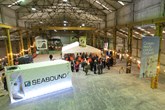ACP increases slots for panamax locks
Published by Oliver Kleinschmidt,
Deputy Editor
Dry Bulk,
In response to the present and projected level of Gatun Lake, the Panama Canal Authority (ACP) has announced through Advisory to Shipping No. A-08-2024; a new adjustment to accommodate the growing demand for transits, by increasing the number of daily slots available in the panamax Locks.
Two additional slots will be offered through auction for transit dates beginning 18 March, and an additional slot will become available for transit dates beginning 25 March.
These measures aim to allow the majority of vessels that want to transit the Canal to have a better chance of obtaining a reservation.
Panama Canal specialists have been closely monitoring the current water situation, and the measures announced, published in the Advisory to Shipping, will remain in effect until conditions warrant change, which will be announced in a timely manner.
Panama and the Panama Canal aim to continue to offer unsurpassed advantages to the world’s maritime commerce due to its strategic geographic location. It has been aware of its responsibilities as the logistics hub of the Americas. The Panama Canal will continue to uphold its role, not merely as a path between seas but as a bridge to a sustainable future, navigating through change with steadfast resolve.
The Panama Canal has been dedicated to enhancing efficiency and responsiveness to the evolving needs of the maritime industry. The introduction of additional slots has reflected its ongoing commitment to maintaining the Panama Canal’s status as a premier global trade route.
Click here for free registration to Dry Bulk
Read the article online at: https://www.drybulkmagazine.com/ports-terminals/18032024/acp-increases-slots-for-panamax-locks/
You might also like
Seabound receives ESA award and completes first full-scale carbon capture units
Seabound celebrates completion of first full-scale maritime carbon capture units and €1.5 million European Space Agency award at event in Doncaster.

